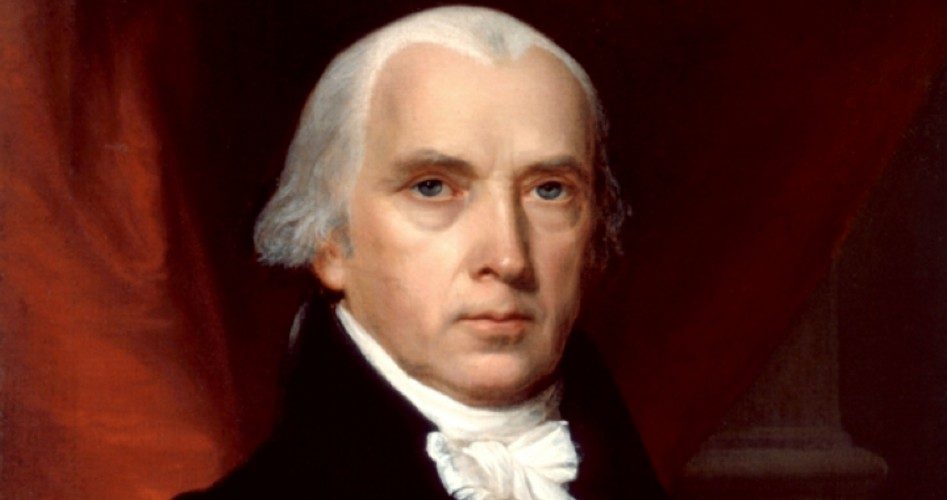
On May 1, Lauren Becker, director of marketing at the Center for Inquiry, declared that “we need to lose religion to save America.”
As part of her plea, Becker makes several significant mistakes in her review of history of the supposed irreligiousness of our Founding Fathers.
Becker’s primary source of support is a proposal to the Virginia General Assembly written in June 1785 by James Madison.
As so many leftists do when they try to hide behind the skirts of the Founders, Becker takes one step too many in her interpretation of the intent of the speaker she summons from history.
In describing what compelled Madison to write “A Memorial and Remonstrance,” Becker claims:
It’s 1784 and James Madison has a problem: the General Assembly of Virginia has just proposed a bill that would establish a special tax to pay for “teachers of the Christian Religion.” The bill has wide support because the Episcopal Church — the dominant church — will benefit greatly from having taxpayers pay for its teachers. Madison, however, knows better. He knows the bill is an attack on the principle of freedom of conscience and a threat to the liberties so recently wrenched from King George III.
So what does he do? What does the future Founding Father, Father of the Constitution, Father of the Bill of Rights, and fourth president of the United States do? He sits down and writes out a list of fifteen reasons why Virginians should reject the bill and any other attempt to mix religion and government.
Well, that’s partially correct. Madison did indeed oppose the establishment of a state religion. This advocacy for the principle of religious liberty was not something Madison developed after learning of the General Assembly’s attempt to continue subsidizing the Episcopal Church. This event was not at all the catalyst Becker claims.
In fact, James Madison played a prominent role in drafting Article XVI of the Virginia Declaration of Rights passed nearly a decade before the events listed by Becker. In this influential statement of rights, Madison (and George Mason) wrote:
That religion, or the duty which we owe to our Creator, and the manner of discharging it, can be directed only by reason and conviction, not by force or violence; and therefore all men are equally entitled to the free exercise of religion, according to the dictates of conscience; and that it is the mutual duty of all to practice Christian forbearance, love, and charity toward each other.
That hardly sounds like the angry, reactionary rant of a man determined to keep religion out of the public marketplace of ideas, or, as Becker writes, to establish “the first secular republic in history.”
To her discredit, Becker goes on to springboard from the “Memorial and Remonstrance” to a setting straight of the “countless people who think America is a Christian Nation founded on biblical principles.”
While the men who helped craft our Constitution and Declaration of Independence held different interpretations of the characteristics of God, of His Son, Jesus Christ, and of the most correct way to worship God, they unanimously and sincerely believed that God was an all-powerful Creator and providentially interceded for mankind, particularly in the quest for liberty and the freedom of conscience that permitted diversity of worship.
Despite the claims of Becker and other designing detractors furthering their own transparent anti-religious agendas, none of our Founding Fathers abhorred religion. To the contrary, they embraced piety and encouraged others to do likewise.
Almost unanimously, these men fervently believed in a merciful Creator who took notice of the affairs of men and took, at times, a very active role in aiding the fight for American freedom.
For example, Benjamin Franklin was the most well-known American of his day. Although raised in the Calvinist environment of New England, young Benjamin was exposed at an early age to the writings of renowned English Whigs and deists, John Locke and Joseph Addison.
Franklin learned from these tutors that the principles of liberty were best promoted by personal piety and public virtue. He drank draught after draught from this cool, clear stream of thought and feasted freely from the cornucopia provided by these thoughtful promoters of freedom.
The more Franklin learned the lessons of the laws of nature and man’s place in the universe of ideas, he understood that religion was not only not an enemy of freedom, but was often its most ardent ally.
The famous Philadelphian witnessed many manifestations of the interest of Providence in the affairs of man. The stories of timely storms, favorable fogs, and other “acts of God” are well known to students of the American War for Independence. God, wrote Franklin, “sometimes interferes by His particular providence and sets aside the effects which would otherwise have been produced by … causes.” Hardly the words of a man who saw the Creator as a hands-off deity.
In that vein, moreover, there is the story retold by James Madison of Franklin’s heartfelt plea made at a critical moment of near-fatal impasse during the rancorous debates that had raged for over a month at the Constitutional Convention of 1787. Madison recorded that the following words were spoken by the Nestor of the Convention:
I have lived, Sir, a long time, and the longer I live, the more convincing proofs I see of this truth — that God Governs in the affairs of men. And if a sparrow cannot fall to the ground without his notice, is it probable that an empire can rise without his aid? We have been assured, Sir, in the sacred writings, that “except the Lord build the House they labour in vain that build it.” I firmly believe this; and I also believe that without his concurring aid we shall succeed in this political building no better, than the Builders of Babel.
There is no need to rehearse every sentence spoken by our Founding Fathers calling upon God for His aid in delivering this country from despotism. They are so well-documented even Lauren Becker could find them if she tried.
Finally, in support of her call to avoid the “dangerous problem” of the widespread “desire to base our national morality on Christian beliefs,” Becker paraphrases Madison’s “Memorial,” converting what historians have described as a “cogently reasoned” measure into an all-out call for abandonment of Christian principles. Madison would not be pleased. Becker makes the common error of confusing of sectarianism with Christianity.
To better appreciate the piety of James Madison and the legitimate purpose for having penned the “Memorial and Remonstrance” (spoiler alert: It isn’t to dissuade his countrymen from embracing the Christian religion), the reader is encouraged to read the original and not Lauren Becker self-serving abridgment.
Despite their various personal dogmas, our Founding Fathers universally recognized the benefit to society of a citizenry that was moral and committed to genuinely conform their behavior to the constraints of their convictions. None of them was particularly evangelical, though all expressed a personal devotion to the teachings of Jesus Christ.
Whether Puritan, Anglican, Presbyterian, or otherwise, the men who crafted our Constitution zealously protected the right of all men to worship as they pleased.
And in matters of good government, our noble forebears agreed that the purpose thereof was justice and the preservation of that liberty that was unique to our Republic. This end was most ably accomplished by recognizing that every one of the unalienable rights they fought so diligently to protect were given to man by God.
As James Madison wrote in his “Memorial” regarding the ability of the agnostic to provide any sort of valuable service to his (or her) country, “Before any man can be considered as a member of civil society, he must be considered as a subject of the Governor of the Universe.”
Joe A. Wolverton, II, J.D. is a correspondent for The New American and travels nationwide speaking on nullification, the Second Amendment, the surveillance state, and other constitutional issues. Follow him on Twitter @TNAJoeWolverton and he can be reached at [email protected].



